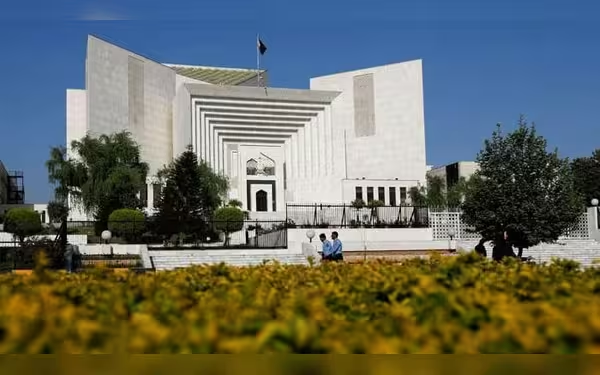Saturday, November 16, 2024 06:28 PM
Senate Committee Approves Increase of Supreme Court Judges to 25
- Senate agrees to raise Supreme Court judges to 25.
- PTI and JUI-F oppose the proposed increase.
- Over 60,000 cases pending in the Supreme Court.
 Image Credits: geo
Image Credits: geoSenate committee approves increasing Supreme Court judges to 25 amid concerns over judicial backlog and independence.
In a significant development for Pakistan's judicial system, the Senate Standing Committee on Law and Justice has agreed to increase the number of Supreme Court judges to 25. This decision comes amid rising concerns over the backlog of cases that have been piling up in the apex court. The meeting, chaired by Senator Farooq H Naek, saw a heated debate, particularly from members of the Pakistan Tehreek-e-Insaf (PTI) and Jamiat-Ulema-e-Islam Fazl (JUI-F), who voiced strong opposition to the proposed increase.
Currently, the Supreme Court has a sanctioned strength of 17 judges, including the Chief Justice of Pakistan. The proposal to raise this number is seen as a necessary step to expedite the judicial process, especially given that over 60,000 cases are pending. Senator Khalil Tahir from the Pakistan Muslim League-Nawaz (PML-N) highlighted the urgency of the situation, stating that the majority of committee members supported the increase for the sake of “speedy justice.”
However, the opposition parties have raised serious concerns regarding the implications of such a move. PTI Senator Hamid Khan described the method of appointing additional judges as an “attack on judicial independence.” Similarly, JUI-F Senator Kamran Murtaza accused the government of attempting to appoint “favourite judges” to the Supreme Court, suggesting that the current judges are functioning adequately without the need for an increase in their numbers.
In a related context, the newly-appointed Chief Justice of Pakistan, Yahya Afridi, recently reported that 59,191 cases are currently pending in the Supreme Court. This alarming figure underscores the pressing need for reform within the judicial system. Earlier, an independent senator from Balochistan, Mohammad Abdul Qadir, had proposed a bill to increase the number of judges to 20, excluding the Chief Justice, citing the backlog of cases as a primary reason.
Federal Minister for Law and Justice Azam Nazeer Tarar has also expressed support for the legislation, emphasizing the need to address cases that have been pending for years, including those related to capital punishment. He pointed out that some individuals have spent decades in jail awaiting a verdict, which raises serious questions about the efficiency of the judicial process.
In an effort to tackle the backlog, two retired judges were appointed as ad hoc judges for a year in July. This move was aimed at providing immediate relief to the overwhelmed court system. However, the government has decided to defer the introduction of a key bill seeking to amend the Supreme Court (Number of Judges) (Amendment) Bill, 2024, in the National Assembly. This bill is expected to be discussed on the upcoming private members' day.
The proposed legislation, which requires a simple majority to pass, aims to increase the number of judges in the Supreme Court of Pakistan. This development is part of a broader effort by the ruling coalition to reform the country’s judicial structure, following the recent 26th Constitutional Amendment that altered the appointment process for the Chief Justice and established fixed tenures.
As Pakistan navigates these changes, the implications for judicial independence and the efficiency of the legal system remain critical. The ongoing debate highlights the delicate balance between ensuring a swift judicial process and maintaining the integrity of the judiciary. It is essential for lawmakers to consider the long-term effects of their decisions on the rule of law and public trust in the judicial system.













